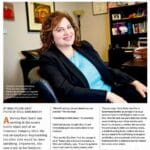Attorney Roni Sokol talks with Good Company (WKYC TV Cleveland) host Joe Cronauer about why having personalized legal help is essential when filing a personal injury lawsuit.
About Roni Sokol
Roni Sokol featured as “Super Attorney” in January 27, 2017 edition of Cleveland Jewish News
In an in-depth interview with the Cleveland Jewish News’ Reagan Anthony, attorney Roni Sokol discusses how her personal experiences have fueled her career, and about making the choice to pursue law school and a career before starting a family. Here is a taste of the interview:
Anthony: Do you find that your experiences continue to motivate you in your work?
Sokol: One of the reasons I wanted to become a lawyer was to be able to give a voice to people who are unable to fight for themselves, or those who have been victimized . . . After 21 years in practice, these desires continue to motivate me daily. It is deeply gratifying to help people who have been wronged or mistreated by others.
Anthony: In an Attorney at Law article from 2016, you allude to feeling pressure to conform to societal norms to start a family and abandon your career. What advice would you offer to the young people who are struggling with this choice?
Sokol: I have seen so many changes in the way women are perceived just in the past 20 years . . . What I would tell young women today is to do what you enjoy . . . There is no longer a right or wrong answer. Whatever gives you personal satisfaction is what is right. It’s that simple.
Attorney At Law Magazine
Roni Sokol, Attorney of the Month, January 2016.
Focusing on the personal side of Personal Injury
Given the right circumstances, it is likely Eleanor Roosevelt and attorney Roni (pronounced “Ronnie”) Sokol could have been good friends. Certainly, Sokol subscribes to Roosevelt’s sage advice, “Do what you feel in your heart to be right-for you’ll be criticized anyway. You’ll be damned if you do, and damned if you don’t.” Sokol’s own experience bears this out.
“When I was single and focused on my education and then career, friends would chide me, ‘You need to get married and start a family. You’re running out of time!’” she says. Then, she did get married and started a family. Although she was on partnership track, she knew if she kept working at that pace she would have little time with her new baby. So, she essentially walked away. But that elicited equal criticism! “Are you crazy, throwing away a six-figure career to be a housewife?” Sokol took these comments in stride.
“I don’t have any regrets,” Sokol continues. After her second child was born, her firm welcomed her back with open arms, agreeing to a part time basis, allowing her more time with her family. But change was in the air.
Decisive Decisions
Not one to vacillate or second-guess, once Sokol makes a decision she takes action. This is not to say that she doesn’t carefully weigh the pros and cons, but once the choice is made, her focus is on making it happen.
Like many undergrads, while attending UCLA, Sokol did not have a clear vision of what she wanted to do with her education. A part-time job with a female solo-practitioner however, kindled an interest in the law. During her senior year she took some law classes.
“I was definitely interested,” she admits, “but I didn’t want to make such a huge financial commitment until I was sure.”
After graduating, she worked for a few years as a legal secretary for litigation attorneys. “I read everything that came across my desk from top to bottom,” she says. “Co-workers would ask me, ‘When are you going to law school already?’ I would answer with a grin, but there came a point where I knew I was ready.”
Unfortunately, there were many other voices determined to convince her otherwise. “So many people will tell you, ‘Don’t do it! It’s the worst!’” she recalls. “I never understood why they would want to discourage someone from seeking an education and bettering herself. I was especially disappointed when women tried to talk me out of it.”
“Sure it is hard and there are some less than pleasurable aspects, like studying day and night and having a limited social life, but I would never tell anyone not to do it!”
Quite the contrary. Sokol, now an award-winning attorney, frequently speaks before various professional groups and is particularly encouraging to young women to follow their dreams.
Always an avid student with a zeal for learning, Sokol threw herself wholeheartedly into her studies. Upon graduation in 1995, she found she had not one, but three attractive employment offers from prominent Los Angeles law firms. For the next seven years, Sokol immersed herself in her work as a defense attorney specializing in construction and insurance bad faith cases. As always, she strived to be the best.
“I became very good at it,” she acknowledges. “I was known as the ‘go-to’ person for all types of insurance questions.”
Of course this constituted long days, sometimes up to 60-plus hour weeks. Working primarily with male counterparts with wives at home to see to the domestic side of their lives, Sokol felt compelled to match them hour-for-hour without complaint. But when she and husband Brian welcomed their first child, that schedule no longer seemed viable.
“The baby went to bed at 7 p.m., so that meant I would see him for less than an hour a day. That seemed crazy,” she says. “I gave my notice. Brian was very supportive, and my employers were very kind; they even offered me a part time schedule. But I wanted to focus all my time and energy on my child.”
Once her second child came along, and Sokol felt she’d given her a good start with plenty of mommy time, she knew it was time to return to law. As mentioned, she was welcomed back enthusiastically and arranged to work a part time schedule. Still, Los Angeles commuting can be daunting. Despite the reduced work hours, Sokol was still spending up to two hours in the car every day. It was time for a change, and one of her famous decisive decisions.
Onward to Ohio
“We’d been talking about moving to my husband’s home state even before my daughter was born,” she says. “We felt it would be a great place to raise our children. Also, we looked forward to being close to his whole extended family.” Her husband was not sure that a California girl could adapt to Ohio winters, but she assured him that she would try her best. “Every time we would come visit his family and got out of L.A., I always felt so relaxed and calm. It’s a very mellow and welcoming environment. I wasn’t going to let a little snow stand in my way.”
Unfortunately, because California doesn’t permit reciprocity, Sokol was forced to take the Ohio bar exam prior to practicing in her new home state. She passed with flying colors, and landed a position with a local defense firm. Though she excelled at her work, Sokol soon felt her passion fading. Whether it was the tedium of endlessly tracking billable hours, or even the fact that she often found herself empathizing too much with the plaintiffs, she was feeling restless.
To effect a change, she took a highly coveted job overseeing severe bodily injury claims with a national insurance company. As she explains, “At first it felt like a dream job—monitoring litigation rather than actually litigating. Also, I learned an enormous amount about how insurance companies evaluate claims. At the same time, I found that I was feeling sorry for the injured claimants and wanted to have the ability to pay them as much as possible. It was a hard position to be in. I’d work day in and day out with all these plaintiff attorneys and thought, ‘I could do that!’”
After agonizing briefly over the risk of starting her own practice, she decided to take the plunge. Although she didn’t know where her first client would come from, that was revealed when her husband came home and advised that he had just given her phone number to a woman at work who had been involved in a serious car accident and didn’t know where to turn.
That was the first of a steady flow of clients to follow, and today The Sokol Law Firm in Beachwood handles an average of 30 to 40 personal injury or civil litigation cases at any given time, often with sizable settlements.
Once the doors opened, Sokol’s practice seemed to take on a life of its own. She did a bit of advertising, but most of her clients come either from word of mouth, the Cleveland Metropolitan Bar Association’s Attorney Referral Service, or from her extensive networking.
Justice for All
Sokol’s website is filled with accolades; the same empathy and compassion she found disconcerting while representing insurance companies, make her clients feel like they are her friends. Offering large firm experience with small firm service, clients receive her undivided attention. In fact, callers are often shocked when they realize the person answering their call is not a receptionist, but Sokol herself.
“Here for you when you need me,” is not just a slogan, but a promise.
“I feel like I have a purpose here,” she says. “I like to be able to help people. I don’t take a case to get rich, in fact, many times I know a case is not going to be particularly lucrative, but I take it anyway because I know that I can help. I represent people who I know have been mistreated and deserve to be compensated.”
A petite dynamo with a warm and welcoming smile, male opponents only underestimate Sokol one time. “Once they spend some time with me, they know I am a force to be reckoned with,” she says with a chuckle. “A couple of attorneys have actually said to me, ‘You seem so sweet and kind, but I definitely wouldn’t want to go up against you in court!’”
Original article is out of publication.
CBC Magazine: Legal Profile: Roni Sokol
By Nina Polien Light | Photo by Doug Khrenovsky
Attorney Roni Sokol was working in the severe bodily injury unit of an insurance company when she had an epiphany: Representing the other side would be more satisfying. Empowered, she sent a text to her husband, Brian, who was away on business.
“What if I quit my job and started my own practice?” the text read.
“Something to think about,” he answered.
Sokol had already thought about it and immediately gave two weeks notice to her employer.
“That was the first time I had the courage to do it,” Sokol, who is licensed to practice in Ohio and California, says. “It was the greatest move I ever made for many reasons, and I wish I had done it sooner. The timing was right. I learned so much about personal injury (law) that I didn’t know before I worked for an insurance company.”
That was 2013. Today Sokol Law Firm in Beachwood handles an average of 30 to 40 personal injury or civil litigation cases at any time. Over the past two years Sokol has settled cases involving a man whose remains were found in a dumpster, a mother who was given the wrong baby by labor and delivery nurses, a disabled nursing home resident who lost a toe as a result of the staff failing to recognize an infection, and an asthmatic child who was hospitalized after a substitute teacher refused her access to her inhaler.
“I like to take unusual cases, especially cases where clients were told by another attorney they had a no-win case,” Sokol says. “I take particular interest in cases involving children, maybe because I’m a mother myself, and it’s very hard for me to see children suffer.”
Sokol’s law practice is thriving — 2014 was her most lucrative year as an attorney. But building up a client base took old-fashioned networking, beginning with her husband, who knew a woman who had gotten in a serious car accident and needed representation.
Subsequent cases came from a combination of word-of-mouth referrals, the Cleveland Metropolitan Bar Association’s Attorney Referral Service, and networking with groups such as BNI, the Beachwood Chamber of Commerce, Women in Networking, and the Ohio Association of Justice. Networking can be difficult, Sokol acknowledges, but it has led to business relationships in which she and other professionals refer clients to and mentor each other.
Being a woman, especially a woman with a male-sounding name who is petite, can also be challenging. Prospective clients have phoned the office, requesting to speak with a man. When she first began practicing law, she was often mistaken for the court reporter or insurance company representative in court or at depositions. And she recalls being addressed by her first name while her male colleagues were referred to as “Mr. Smith” or “Mr. Jones.”
“Once they read a motion I’ve written, hear me in court or negotiate with me, then I get respect, but I think it’s something women have to earn,” Sokol says. “It’s changing, though. I think there’s more tolerance now than when I first started practicing in the 90s.”
An award-winning attorney who frequently speaks at professional organizations, Sokol encourages young women to follow their passion unabashedly.
“My kids understand that mommy works,” she says. “When they were little, I did feel somewhat guilty, but I learned that it’s actually good for their self-esteem — and mine — to have a mother who has a professional career. It’s good for my kids to see that their mom is able to do many different things.”



